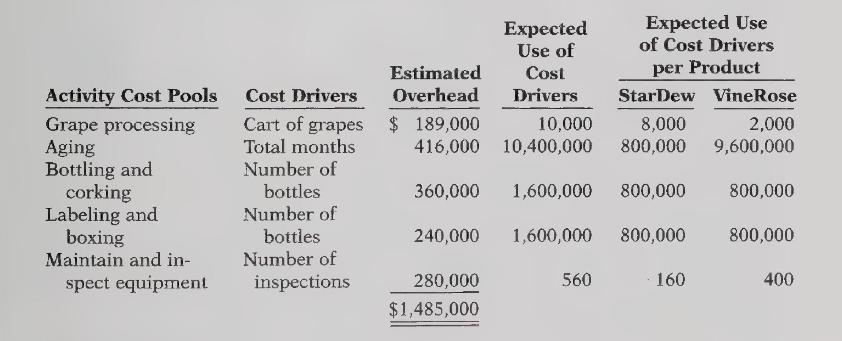Vino Verite Corporation produces two grades of wine from grapes that it buys from California growers. It
Question:
Vino Verite Corporation produces two grades of wine from grapes that it buys from California growers. It produces and sells, in 1 -gallon jugs, roughly 800,000 gallons per year of a low-cost, high-volume product called StarDew. It also produces and sells roughly 200,000 gallons per year of a low-volume, high-cost product called VineRose. VineRose is sold in 1 -liter bottles; thus 200,000 gallons results in roughly 800,000 bottles. Based on recent data, the StarDew product has not been as profitable as VineRose. Management is considering dropping the inexpensive StarDew so it can focus more attention on the VineRose line product. VineRose already demands considerably more attention than StarDew.
Jorge Rojo, president and founder of Vino Verite, is skeptical about this idea. He points out that for many decades the company produced only the StarDew line, and that it was always quite profitable. It wasn't until the company started producing the more complicated VineRose wine that the profitability of StarDew declined. Prior to the introduction of VineRose the company had simple equipment, simple growing and production procedures, and virtually no need for quality control. Because VineRose is bottled in 1 -liter bottles it requires considerably more time and effort, both to bottle and to label and box, than does StarDew. (There are roughly 4 liters in a gallon; thus the company must bottle and handle 4 bottles of VineRose to sell the same amount of wine as StarDew.) StarDew requires 1 month of aging; VineRose requires 1 year. StarDew requires cleaning and inspection of equipment every 5,000 gallons; VineRose requires such maintenance every 500 gallons.
Jorge has asked the accounting department to prepare an analysis of the cost per gallon using the traditional costing approach and using activity-based costing. The following information was collected.


Instructions:
Answer each of the following questions. (Round all calculations to three decimal places.)
(a) Under traditional product costing using direct labor hours, compute the total manufacturing cost per gallon of both products.
(b) Under \(\mathrm{ABC}\), prepare a schedule showing the computation of the activity-based overhead rates (per cost driver).
(c) Prepare a schedule assigning each activity's overhead cost pool to each product, based on the use of cost drivers. Include a computation of overhead cost per unit.
(d) Compute the total manufacturing cost per gallon for both products under ABC.
(e) Write a memo to Jorge Rojo discussing the implications of your analysis for the company's plans. In this memo provide a brief description of ABC, as well as an explanation of how the traditional approach can result in distortions.
Step by Step Answer:

Accounting Tools For Business Decision Making
ISBN: 9780470377857
3rd Edition
Authors: Paul D. Kimmel





